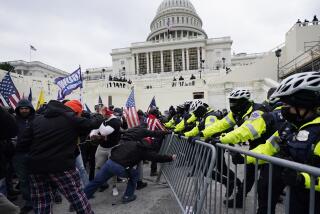Drawing the Lines on Police Power
- Share via
In a welcome decision, the U.S. Supreme Court has barred police from stopping a pedestrian based on an anonymous tip alone. The ruling is particularly noteworthy because this court has gone a long way in recent years to sanction police behavior once considered beyond the bounds.
In January, for instance, the court said it was reasonable for police to chase and stop a person for no reason other than that he suddenly runs away as they approach. And last year the court ruled that a police officer who stops a car and has reason to suspect it contains illegal drugs or guns may search everything in the vehicle, including a passenger’s belongings. These and other rulings have distanced the court from the wariness about police power evident in decades past.
In the case decided on Tuesday, an anonymous caller reported to Miami police that a black male wearing a plaid shirt near a pawnshop had a hidden gun. Even though the tip led police to stop a man matching the description, and a gun was discovered in his pocket, the court held that the single, brief telephone tip “left the police without a clue concerning the caller’s knowledge or credibility” and could allow anonymous callers to target innocent people. “The Fourth Amendment is not so easily satisfied.”
The ruling follows the highly publicized fatal shootings within the past year of four unarmed black men by New York police, along with charges that police in several other cities engage in racial profiling: stopping motorists or pedestrians solely on the basis of their race.
Given the political backdrop, the Miami ruling does raise the question of whether a less-than-specific description of a suspect from a more identifiable tipster would pass muster.
A key to how far the court intends to remake police power will come later this month when it hears arguments in Dickerson vs. U.S. on the reach of the Miranda rule.
Since 1966, police have been required to tell suspects of their rights to remain silent or to have a lawyer present before they are questioned. The court in 1966 fashioned the Miranda warning to stop police from browbeating innocent people into confessing to crimes. The issue is back before the court because of a long-forgotten provision in a 1968 anti-crime bill. The case poses a question fundamental to our criminal justice system: Is it required that the Miranda warnings be given to suspects about to undergo questioning, or are they merely suggestions?
In our view, there is no room for discretion here. Miranda stands.
More to Read
Sign up for Essential California
The most important California stories and recommendations in your inbox every morning.
You may occasionally receive promotional content from the Los Angeles Times.













